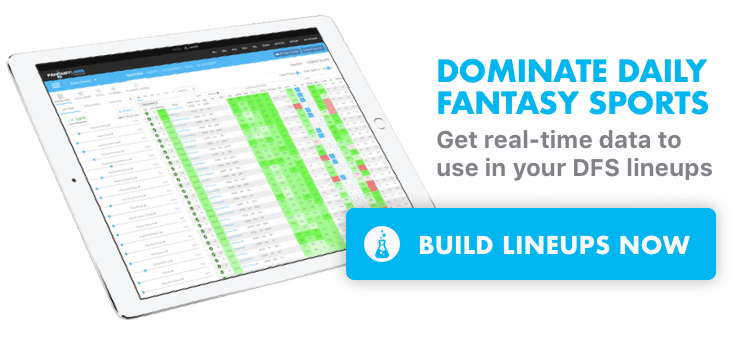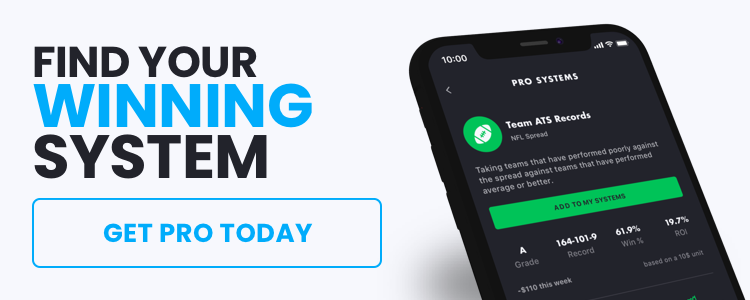The MLB Playoffs get underway on Tuesday with the NL Wild Card game between the Milwaukee Brewers and Washington Nationals at 8:08 p.m. ET.
The playoffs mean the single-game formats will take center stage, so let’s start by taking a brief look at the different strategies for DraftKings and FanDuel.
Format
FanDuel will use its traditional single-game format. That means you’ll have to roster one MVP, one All-Star and three utilities. Your MVP will get a 2x scoring bonus while your All-Star will get a 1.5x scoring bonus. You don’t need to pay additional salary to roster players in those premium spots.
FanDuel also features only hitters. You won’t have to worry about choosing between any of the pitchers on either roster and can focus simply on which batters you think will score the most fantasy points.
The DraftKings format is a little more complicated. For starters, you have to roster six players instead of five, and you’ll have to choose between batters and pitchers. DraftKings also features a captain, who earns a 1.5x scoring multiplier, but will cost 1.5x their traditional salary. For example, Max Scherzer costs $12,600 as a utility, but he’ll cost $18,900 if you want to roster him at Captain.
Relief pitchers also become viable options in this format. They aren’t as dominant as they were in previous seasons — last year they earned more points for innings pitched and strikeouts than starting pitchers — but they still have the potential to provide excellent value at their current salaries. Most of the relievers are priced at the absolute minimum on DraftKings, so pitchers who have the potential to pitch multiple innings are particularly intriguing.
Pitchers
Scherzer will get the nod for the Nationals, and it’s tough to make a case against him on DraftKings. No one on the slate can match his floor, ceiling or median projection in our MLB Models.
He put together another dominant campaign in 2019, pitching to a 2.92 ERA, 2.45 FIP and 12.69 K/9. He also finished second among NL pitchers in Wins Above Replacement and is one of the favorites for the NL Cy Young award.
Unsurprisingly, his Vegas data vs. the Brewers is strong. He owns a 3.2 opponent implied team total and -185 moneyline odds, and pitchers with comparable marks in both categories have historically averaged 21.06 DraftKings points per start (per the Trends tool).
Where Scherzer really stands out is with his strikeout upside. The Brewers own the sixth-highest strikeout rate against right-handers this season, and their projected lineup owns a 28.2% strikeout rate against right-handers over the past 12 months. Vegas has set his strikeout prop at 9 for this matchup, and he could breeze by that total if he has his best stuff.
That said, we haven’t really seen Scherzer’s best stuff in quite some time. He missed nearly a month due to a back injury, and he didn’t look like the same pitcher after he returned to the rotation. He pitched to a 4.74 ERA over his final seven starts, and the Brewers offense is still capable of doing some damage even without Christian Yelich.
There is some risk with Scherzer, but he still has the potential to be in the winning lineup even in a bad start. He’s very tough to fade.
Things aren’t as clear with the Brewers. Brandon Woodruff will get the ball to start the game, but he’s expected to be limited to just 40 pitches. He’s priced only $2,600 cheaper than Scherzer at utility, and he doesn’t offer nearly the same strikeout upside. The Nationals have posted the fifth-lowest strikeout rate vs. right-handers this season, including the third-lowest mark since the All-Star break. He’s an easy fade.
Woodruff’s likely early departure does open up plenty of value with their relievers. Of course, any mention of the Brewers bullpen starts with Josh Hader, and he should undoubtedly make an appearance in today’s must-win contest. Hader hasn’t been as dominant as he was last season — his 3.10 FIP is nearly a full run higher than his mark from last year — but he does provide the ability to rack up strikeouts and pitch multiple innings. He should be one of the higher-owned players on the slate, and deservedly so.
Hader is not the only left-handed weapon at the Brewers’ disposal. Brent Suter won the NL Reliever of the Month award in September, and he’s pitched to a 0.49 ERA this season. Drew Pomeranz has also become Hader-lite as a member of the Brewers, pitching to a 2.39 ERA and 15.4 K/9, although he’s not really a DFS option because of his salary.
From the right side, Junior Guerra and Jay Jackson figure to serve as primary relievers. Of the two, Jackson offers more value from a DFS perspective given his superior 13.9 K/9.
Batters
Nationals Lineup
- 1. Trea Turner (R)
- 2. Adam Eaton (L)
- 3. Anthony Rendon (R)
- 4. Juan Soto (L)
- 5. Howie Kendrick (R)
- 6. Asdrubal Cabrera (S)
- 7. Kurt Suzuki (R)
- 8. Victor Robles (R)
Turner will bat leadoff for the Nationals, and he’s the most-expensive offensive option in this game. He has the ability to do damage with his bat — he’s posted a 120 wRC+ vs. right-handers and a 107 wRC+ vs. left-handers this season — and he’s an absolute terror on the bases. He racked up 35 steals in 122 games, and opposing catcher Yasmani Grandal allowed a whopping 72 steals during the regular season. Turner has a huge ceiling in this contest.
Soto is the Nationals’ best source of pop vs. right-handed pitchers. He’s posted a .299 ISO against right-handers over the past 12 months, and 28 of his 34 HRs came against right-handers this season. He will likely get two at-bats vs. Woodruff, but don’t be surprised if the majority of his plate appearances later in this game come against southpaws.
Rendon is a hitting machine, and he finished the season with a .319 average and .412 on-base percentage. He is equally dominant against both left- and right-handed pitchers, although he does have slightly more pop against southpaws. He’s a relatively safe option on today’s slate, but his Statcast data from the past 15 days is subpar.
Kendrick had a career resurgence with the Nationals this season, posting a .344 batting average over 121 games. He’s batting directly behind Soto in the Nats lineup, which makes him really intriguing. If the Brewers opt to bring in a left-hander to pitch to Soto, there’s a good chance that they’ll leave him in to face Kendrick, who has absolutely mashed against southpaws this season, posting a 165 wRC+.
Cabrera is one of the Nats’ cheaper options at $8,200 on DraftKings, and he enters this contest in excellent recent form. He’s posted an average distance of 236 feet, exit velocity of 98 miles per hour and hard-hit rate of 62% over his past 11 games, all of which represent significant increases compared to his 12-month averages. He’s also a switch-hitter, so you don’t have to worry about his hitting splits against relievers.
Brewers Projected Lineup
- 1. Trent Grisham (L)
- 2. Yasmani Grandal (S)
- 3. Mike Moustakas (L)
- 4. Keston Hiura (R)
- 5. Ryan Braun (R)
- 6. Eric Thames (L)
- 7. Lorenzo Cain (R) — questionable
- 8. Orlando Arcia (R)
The Brewers bats are significantly cheaper than the Nationals bats, which makes sense given their matchup vs. Scherzer. Still, they have plenty of upside. Scherzer has struggled in particular with home runs since returning from the IL — he’s allowed an average of 1.88 HRs per nine innings — so don’t be surprised if the Brewers manage to put a few balls in the seats.
Moustakas and Thames both stand out as batters with strong HR upside. They’ll have the splits advantage vs. Scherzer, and both have posted an ISO of at least .267 vs. right-handers over the past 12 months. Thames is slightly more expensive despite the fact that he’s batting lower in the order, so he should command lower ownership.
Hiura may not be a household name yet, but he has the look of a future star. He tore up MLB pitching over the second half of the season, posting a .324 average, .413 wOBA and 155 wRC+. He was also far better against right-handers than left-handers this season, so he can succeed vs. Scherzer despite being in a righty-righty matchup.
I’m not sure why Grandal is so cheap today, but I’m not complaining. He’s a switch-hitter who has fared better against southpaws this season, but his numbers against right-handers are still impressive: .350 wOBA, .201 ISO, 114 wRC+. He’s also expected to occupy the No. 2 spot in the lineup, which gives him the potential for an extra at-bat.
Braun may be on the downside of his career, but he’s been absolutely raking recently. He’s posted a 15-day/12-month distance differential of +53 feet and hard-hit differential of +19 percentage points, both of which rank first on the Brewers. Don’t ignore him just because he’s on the wrong side of his splits vs. Scherzer.
Good luck, and be sure to check out The Action Network if you’re looking for more in-depth MLB analysis.
After this piece is published, FantasyLabs is likely to provide news updates on a number of players. Be sure to stay ahead of your competition with our industry-leading DFS-focused news blurbs.
Pictured above: Brewers RP Josh Hader (71)
Photo credit: Michael McLoone-USA TODAY Sports



